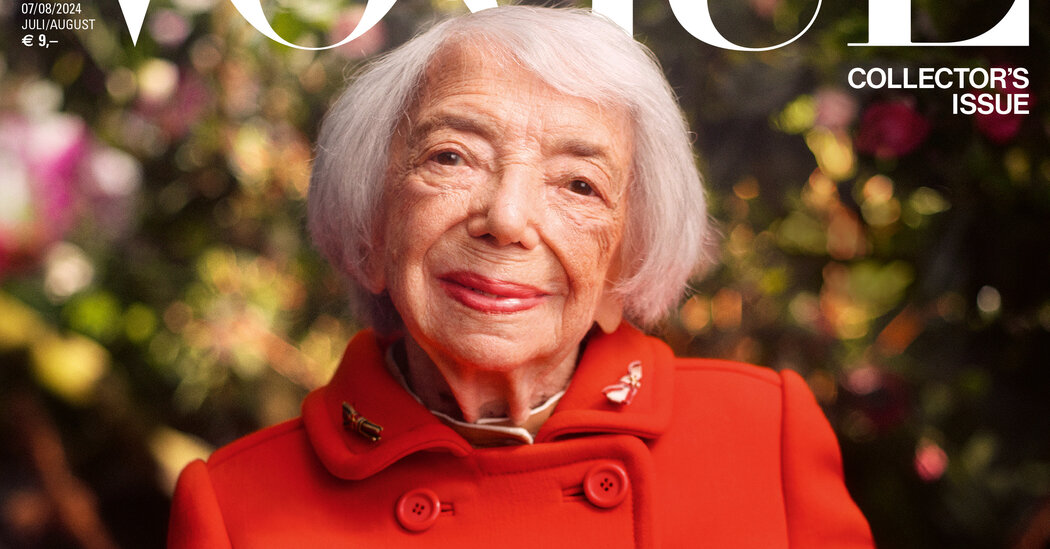Margot Friedländer, a 102-year-old Holocaust survivor whose family was murdered in Auschwitz, seems an unlikely – even radical – choice to front a fashion glossy that usually features good-looking models and celebrities. But the weathered and white-haired Ms. Friedländer is Vogue Germany’s latest cover star, a distinction she appears to wear as lightly as the tailored coat she models in the magazine’s July/August issue.
Ms. Friedländer, one of the world’s oldest and perhaps best-known Holocaust survivors, is no stranger to fame. She has met world leaders such as Angela Merkel, the former Chancellor of Germany, and worked with A-listers such as Helen Mirren.
Ms. Friedländer (née Bendheim), who lives in Berlin, is a vocal advocate of Holocaust remembrance. She has made it her mission to visit hundreds of schools across Germany and urge her young audience not to forget past traumas or cling to the grievances that continue to polarize people.
In the interview with Vogue Germany, as in those conversations, she expresses her concern about the rise of right-wing populism and anti-Semitism in Germany and around the world.
Her layered message resonates with Anna Wintour, editor-in-chief and global editorial director of Vogue and chief content officer at Condé Nast. While the American edition of Vogue did not feature Ms. Friedländer on the cover and does not yet feature a cover star of her ilk, Ms. Wintour called the cover of German Vogue “brilliant and inspiring” in an email.
“Margot Friedländer is a wonderful subject, and a meaningful one,” Ms. Wintour said, “given the political currents across Europe.”
People like Ms. Friedländer “are the last living proof of a dark period in history,” said Masha Pearl, executive director of the Blue Card, a New York-based organization that provides financial and emotional assistance to Holocaust survivors in the United States . “It is imperative to raise awareness for the remaining survivors, whose numbers are dwindling,” she added.
At 102, Ms. Friedländer has spent decades on the cover of America’s oldest Vogue, a group that also includes fashion designer Miuccia Prada, who appeared on the magazine’s March cover this year at age 74. But Ms. Friedländer is not the oldest person to appear on a Vogue cover: Apo Whang-oda tattoo artist, appeared on the April cover of the Philippine edition last year when he was 106 years old.
Ms. Friedländer was 12 when Hitler came to power and in her early twenties when the Gestapo arrived in 1943 to round up her family and herd her mother onto one of the Nazis’ infamous transport ships to Auschwitz.
Mrs. Friedländer was not at home when her family was detained. Soon after, she dyed her hair, began wearing a cross and was hidden for 13 months by anti-Nazi sympathizers whose names she was never allowed to learn, she told The Forward in 2013. article.
In 1944 she was captured by the Gestapo and deported to the Theresienstadt concentration camp, in what is now the Czech Republic. She witnessed and suffered the atrocities of the Nazis. She also met Adolf Friedländer and married him in a traditional Jewish ceremony after the liberation in 1945. The following year, the couple emigrated to the United States and settled in Queens, New York.
It was only after her husband’s death, in 1997, that Mrs. Friedländer thought about using her life experience for a memoir. While she was writing it, she was approached by a documentary filmmaker, who convinced her to tell her story on camera – and return to Berlin in the early 2000s to film the project.
The documentary “Don’t Call It Heimweh” was released in 2004, and her book “Try to Make Your Life: A Jewish Girl Hiding in Nazi Berlin” in 2008. Two years later, Ms. Friedländer, When She Ended was in the 80s, she moved back to Berlin.
Since then, she has addressed thousands of people and, as she told Vogue Germany, has spoken “on behalf of the victims who can no longer speak for themselves.” Her message is not so much about forgiveness, but about endurance and the loving embrace of humanity.
Ms Friedländer told Vogue Germany that since the start of the war between Israel and Hamas, she has been asked by many young people whether she supports Israel or Palestine. Her answer is: don’t take sides. “Don’t look at the things that separate you,” she tells them. “Think of the things that bind you, that bring you together.”
She is grateful that she “made it” and especially grateful, she told Vogue Germany, that she took the advice of her mother, who, when she was deported by the Nazis, hastily left a note for Ms. Friedländer. In it she wrote: “Try to make your life.”
“I am grateful,” said Ms. Friedländer, “that I did indeed do that.”





